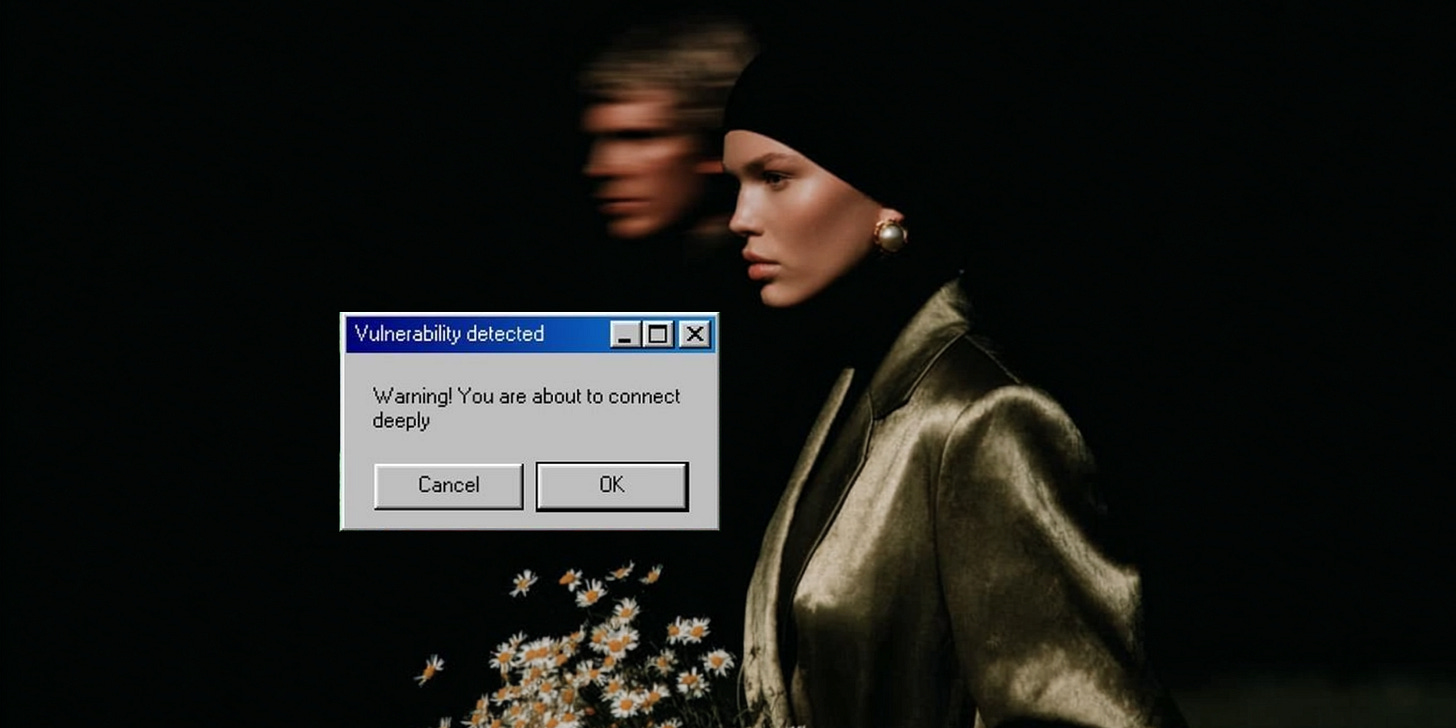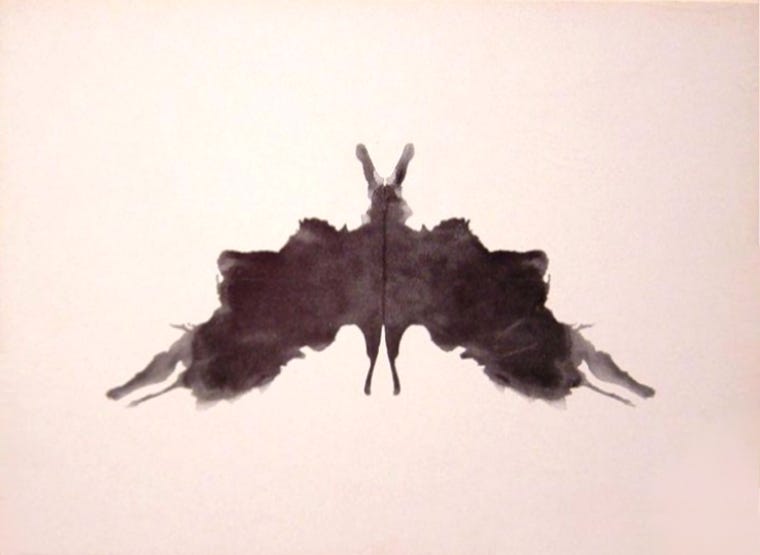First of all, welcome—and thank you!—to all my new subscribers. The last week has been wildly eye-opening, to say the least. Even though I’ve written at length about the importance of showing up authentically and not caring what people think about you, I realized I wasn’t fully taking my own advice until about 7 days ago. I abhor identity politics and don’t really consider myself to be one thing or another, but this platform tends to lean left, and knowing that, I caught myself sandpapering my edges, self-censoring and sanitizing because I didn’t want to alienate people. I told myself I was being thoughtful and nuanced, but honestly, I was just trying to avoid the algorithmic landmines that punish you not just for being wrong, but for being a real flawed human.
While I don’t subscribe to identities in the political sense, the world increasingly demands that you pick one (and state it upfront) before you’re allowed to be vulnerable. So, that’s what this essay is about. Not politics, exactly. But unpacking what it means to be emotionally honest when every form of honesty is now interpreted through a political lens, and what it means to risk being seen when being seen now comes with terms and conditions. What happens to emotional honesty in a culture that rewards performance and punishes complexity?
We’ve built a society that fetishizes authenticity—and then penalizes people the second they show it.
There’s something strange happening to vulnerability.
Something quiet but corrosive.
What used to be a shared language of connection—emotional honesty, rawness, the courage to say “I don’t know”—has mutated into a kind of ideological Rorschach test. Not a bridge between people, but a filter. A litmus test. A way of sorting who’s “safe” to get close to, and who isn’t. And the stakes feel impossibly high. One stray word, one unqualified opinion, and suddenly your emotional truth becomes a liability. Not just for you, but for anyone listening.
In that way, vulnerability hasn’t just become harder. It’s become conditional.
“Tell me how you vote, before you tell me how you feel.”
Before the algorithms and the hashtags and public identity as performance, vulnerability used to be a private act, or at least a sacred one. It was the emotional risk of being fully seen—by a lover, a friend, a coworker, a therapist, a god. It was clunky, personal, non-performative. Sometimes embarrassing. And it wasn’t necessarily designed for validation, so much as about being in contact with reality. You admitted your fear, your shame, your failure, and someone met you in it.
Even in religious traditions, vulnerability had spiritual weight. In confession or repentance, the goal wasn’t to be seen as good. It was to be made honest. In ancient texts and stoic writings, vulnerability wasn’t a brand or a bargaining chip. It was a necessary ingredient for communion. For presence. For humility.
Then came the pop-psych era—Brené Brown, TED Talks, journal prompts. Vulnerability became a trending concept, rebranded as a kind of emotional leadership. And while that had some merit (especially in helping people name their internal lives), it also flattened something. Vulnerability became content. A soft aesthetic. A skill to monetize, curate, and perform.
Still, even that era feels simpler than the one we’re in now. Because now, being vulnerable doesn’t just mean being brave, it means being ideologically legible. It’s not just about what you share, but how you preface it, position it, and align it.
the terms and conditions of intimacy—
Try saying something real these days—really real—and watch how fast it gets intercepted. Not responded to. Not witnessed. But decoded, scanned, and evaluated for allegiance.
Say you’re exhausted from trying to “do the right thing” in online discourse. You’ll be asked: what do you mean by right?
Say you’re uncomfortable with the aesthetic of modern feminism. You’ll be told: you sound like a redpill tradwife.
Say you support Israel’s right to exist and defend itself. You’ll be called a colonialist, a genocide apologist, a Nazi—which still confuses the hell out of me, to be honest.
Say you’re wary of “affirmative care” for minors. You’ll be labeled anti-trans, dangerous, fascist, uneducated.
You might not say any of those things cruelly. You might say them with nuance, hesitation, context. But it doesn’t matter. Because the algorithm doesn’t reward context and the modern listener doesn’t always want understanding.
They want alignment. And fast.
We’ve started to treat vulnerability as if it must come with a side of proof. Proof that you’re good, that you’re safe, that you’re on the right team. The pain alone isn’t enough. You must be hurting in a way that aligns with the current social contract. Otherwise, it’s considered dangerous. Threatening, even.
It’s a strange thing… to want intimacy, but only from people who already agree with you on everything. It’s something I’m having a really hard time wrapping my head around lately, which I guess, is part of the reason I’m writing this now.
And to be fair, it makes sense, in a way. Belonging is a primal survival mechanism. We’re wired to conform to the tribe. In earlier eras, being cast out meant death. Now it means losing followers or friends—but our nervous system doesn’t know the difference. So we contort. We shrink. We hide in plain sight. Just to avoid the feeling of being seen wrong.
the modern Rorschach test—
The Rorschach test, in psychology, was never about the inkblot itself. It was about the projection. What you see in the image says more about you than about the ink. It reveals your mental filters, your internal maps, your fears.
We are living in a Rorschach world.
Every sentence is an inkblot now. Every confession, every post, every attempt at honesty is a silhouette people will interpret based on their prior beliefs.
You say “I feel scared” and someone hears “You’re fear-mongering.”
You say “I feel ashamed” and someone hears “You’re rejecting your identity.”
You say “I’m confused” and someone hears “You’re not qualified to speak.”
We don’t hear each other anymore—we hear our interpretations of each other.
And that’s what makes vulnerability so high-stakes today. It’s no longer received as a human gesture. It’s interpreted as a political position, a cultural signal, or worse—an existential threat.
We used to fear being misunderstood. Now we fear being mischaracterized.
And the cost of that mischaracterization—social exile, moral condemnation, career blowback—makes many of us default to silence. Or worse: performance.
Have you caught yourself self-censoring lately? What conversations are you afraid to have—even with people you trust and love?
the death of closeness—
If you can’t be fully vulnerable, you become partially performative. And most people are. We perform our struggles in a way that feels safe. Digestible. Signal-approved. We wrap every story in a caveat, every confession in a trigger warning, every truth in a paragraph of ideological throat-clearing. Just in case.
And here’s the irony: we’re talking more than ever. Writing more. Sharing more. But we are emotionally malnourished. Because underneath the performances, there is no trust.
No contradiction allowed. No space to be half-baked. No grace for being in process.
Instead, we self-sort. We curate friend groups who won’t challenge us. We build social feeds like echo chambers. We preemptively unfriend people over mild disagreements. We assume the worst of those we barely know.
In a way, we are emotionally constipated. Desperate to be known, but terrified to be seen. Desperate to connect, but unwilling to risk contradiction. And so, we go performative. Polished. Palatable.
But performance doesn’t create intimacy.
And deep down, we know it.
so, what now?
If we want to reclaim something real, we have to start by dropping the purity tests.
We have to remember that ideological alignment is not a prerequisite for emotional safety. That you can feel profoundly connected to someone whose worldview doesn’t mirror your own. That disagreement is not violence. That silence is not complicity. That nuance is not cowardice.
We also have to make space for clumsiness again—for partial thoughts, unfinished processing, and contradictory emotions. No one is born fully articulated. Most of us become clear by first being messy. If we deny each other that right, we kill the very thing we claim to be defending: growth.
At a personal level, I think this means a return to simplicity.
Tell the truth, even if it feels unsophisticated.
Ask questions, even if they feel naïve.
Speak from your own interior, not from what you think people want to hear.
And when someone else does that? Don’t read them like a Rorschach test.
Don’t immediately project your worst fears onto their words.
Don’t assume their pain is political.
Don’t require an essay-length disclaimer before you let them be human.
Because vulnerability isn’t just about pain. It’s about permission. Permission to not know. To not perform. To not speak in slogans. But that kind of vulnerability—the kind that builds real bridges—only works when it’s met with presence, not projection. With listening, not labeling. With grace, not tribal reflex.
I’m not writing this because I’ve figured it all out. I’m writing it because I’m trying to stop filtering myself mid-sentence. I’m trying to speak from the middle of the thought—not the end. And I think more of us are craving that kind of space, even if we’re scared to admit it.
What does it mean to be vulnerable now?
It means doing something radically uncool in a polarized world: saying what’s true, without checking whose team it helps. Letting people surprise you. Being real, even when it’s risky. Because ultimately, vulnerability is not a PR strategy, or a loyalty test, or an algorithmic pose.
It’s what makes you human.
It’s what makes all of this worth doing.
And if we lose that… we lose everything else too.
—S










I don't remember how exactly I came upon your Substack, at some point over the summer, in a way that is I'm sure serendipitously connected with my interests in AI and art, AI and truth. I've enjoyed your stream-of-consciousness approach to posts, your ability to weave, maybe not an argument, but an assessment, an emotion even, around matters of public discourse and culture. Now, I do not agree with some of the things you have been writing as of late, but I've always been naturally inclined to build bridges when others burn them, to understand every idiom or community, to learn, to offer other viewpoints, to find commonwealth where possible - knowing it's not always possible, and sometimes history tells us we have to push, even fight, back. But that's not where we are here, and I welcome your openness and invitation for critical dialogue.
Now, as to the politics of vulnerability. You are right, we have been prone to, encouraged to (social media and mobile phones dramatically lowered the bar of public self expression), incentivized even (think "personal branding") to share more of ourselves, to perform something akin to intimacy in public. But the reality is that anything that's in the public eye is a performance, and that's where there's a paradox that won't be resolved. There's always something that's out of the frame, that's edited out or hidden. True intimacy only exists in spaces where we don't have to perform, where we can just be, safe to be honest and vulnerable, but at the same time available to receive criticism. A priest in the confessional or a therapist in their office, held to secrecy by ethics or deontology, a loving friend, kin or spouse, telling us the hard truth we need to address about an ailment, a mistake, a path down which we err.
I think that the cost of true intimacy, that of being vulnerable enough that you can hear you're doing something wrong, is not one we are able to bear in public. For intimacy comes with a cost, that of hearing things you don't like to hear, that you might not even want to hear even. And if we claim to embrace intimacy in the open, then we must welcome contradiction, disagreement, and losing followers. This is the cost of being intimate in the open. That might be unfortunate, as the foundations of any civic construct rest on civil disagreement. But maybe, just maybe, that kind of disagreement is only possible if we approach others not with our full selves from the start, but with versions of ourselves that they can understand, that they feel understand them too. In other words being intimate in the open might be a pretense for foregoing the possibility of civic discourse and civil disagreement, it might be an excuse for digging one's heels, and waiting to find others who are like us, so that we may lament, in our shrunk commonwealth, about those that we don't understand, and that don't understand us.
This is quite possibly the best thing I have read on how to make sense of this moment in social media— which has become real life for so many of us.
I would add an example from the pandemic wars: if you say “I think we should be cautious about requiring public responders to get vaccinated (and disregarding their legally permitted religious exemptions), because there will be huge collateral damage if they all quit”, you risk being characterized as an “anti VAXXER“ “pandering to the law and order crowd“ or the worst, which was leveled at me repeatedly, “endangering all of our health and being a dangerous person who must be publicly, shamed, unfriended, and blocked.”
Last year I encountered someone in public who had formed an opinion of me, based on her projections about a handful of social media posts, and had no hesitancy sharing it with me with all the smug and certain viciousness of the online world. That was a first in my experience, as I had thought in person people would not be so unkind, and that they were perhaps just performing for their friends on social media when attacking me. I came to realize in this conversation that it was her belief that “ Everybody knows you’re ______” fill in the blank with any word you like, but her preferred ones were Republican, conservative, privileged. In my community those words irrevocably damage both professional and personal associations.
Since then, my city has not recovered from the pandemic crash in public responders as they did, in fact, refuse the vaccine and were fired. Fentanyl has taken over the streets and refuses to quit, small businesses and large have fled in the face of relentless shoplifting and a level of violence we had never seen here before. (The classic weekly crime is now stealing a car and using it as a tank to crash through the entry of a shop, causing tens of thousands of dollars of damage to the structures of buildings, as well as then emptying out the store of its goods and sometimes hurting or killing people inside.) We have one of the very highest retail crime and property theft rates in the nation. I am not sure we are ever going to put civic structures back together.
Yet to consider the future, to consider the results of ideologically rigid pandemic policies, and to ask for a conversation that would weigh the collateral damage was not permitted. I believe if Democrats had stopped for a minute and mediated their stances and been more amenable to common sense we would not have the anti vaccination/ anti-modern medicine movement we have today — and we might have a sane person heading our federal health department, who actually listens to scientists and doctors.